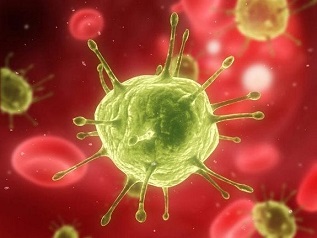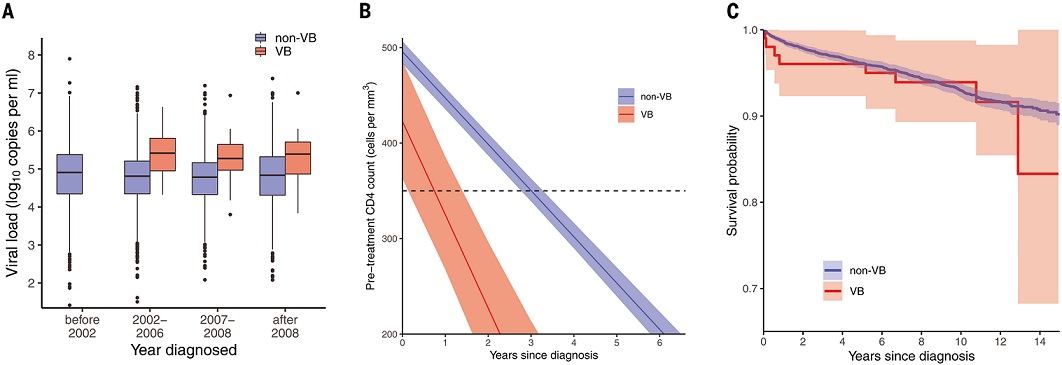BREAKING! New Highly Virulent HIV Variant Discovered In Netherlands That Is Now Spreading Around Europe! Beware Having Sex With The Dutch Or British!
VB HIV Variant: An international team of researchers led by Oxford University-UK And Stichting HIV Monitoring Research Institute-Netherlands have discovered an alarming new highly virulent HIV variant in Netherlands that is fast spreading around Europe. The new variant replicates faster causing high viral loads, attacks and depletes the CD4 cells more aggressively and rapidly, and was found to be more transmissible!

Updated data from HIV monitoring centers in Europe show that the Netherlands and the United Kingdom are the current hotspots of the new
VB HIV Variant despite cases also being identified elsewhere in Europe! The variants are more predominant among the heterosexuals than among the gay community although clusters have already been found in certain gay groups.
The new subtype-B HIV-1 or VB variant is highly aggressive towards the CD4 cells and depletes these cells rather rapidly leading to faster disease progression and severity.
The multidisciplinary study team included researchers from PSL Research University-France, European Bioinformatics Institute-UK, University of Amsterdam-Netherlands, Wellcome Sanger Institute-UK, Karolinska University Hospital-Sweden, Robert Koch Institute-Germany, University of Lausanne-Switzerland, John Hopkins University-USA, Helsinki University Hospital-Finland, US NIAID-NIH-USA and University College London-UK.
The study team found a highly virulent variant of subtype-B HIV-1 in the Netherlands. One hundred and nine individuals with this variant had a 0.54 to 0.74 log10 increase (i.e., a ~3.5-fold to 5.5-fold increase) in viral load compared with, and exhibited CD4 cell decline twice as fast as, 6604 individuals with other subtype-B strains.
It was found that without treatment, advanced HIV ie CD4 cell counts below 350 cells per cubic millimeter, with long-term clinical consequences is expected to be reached, on average, 9 months after diagnosis for individuals in their thirties with this variant.
Age, sex, suspected mode of transmission, and place of birth for the aforementioned 109 individuals were typical for HIV-positive people in the Netherlands, which suggests that the increased virulence is attributable to the viral strain. Genetic sequence analysis suggests that this variant arose in the 1990s from de novo mutation, not recombination, with increased transmissibility and an unfamiliar molecular mechanism of virulence.
The study findings on the discovery of the new HIV variant were published in the peer reviewed journal: Science.
https://www.science.org/doi/10.1126/science.abk1688
The ongoing COVID-19 pandemic has demonstrated that new mutations in viral genetic sequences can have significant impacts on the virus's transmissibility and the damage it causes.
For years now, there have been concerns that this could arise in the HIV-1 virus, which already affects more 38 million people worldwide, and has caused 33 million deaths to date.
https://www.unaids.org/en
Alarmingly, the discovery of the new highly virulent HIV variant c
ould derail a lot of efforts in the area of drug and treatment protocols and research.
The study findings found that individuals infected with the new "VB variant" (for virulent subtype B) showed significant differences before antiretroviral treatment compared with individuals infected with other HIV variants ie
individuals with the VB variant had a viral load (the level of the virus in the blood) between 3.5 and 5.5 times higher!
More concerning, the rate of CD4 cell decline (the hallmark of immune system damage by HIV) occurred twice as fast in individuals with the VB variant, placing them at risk of developing AIDS much more rapidly.
Even more worrisome, individuals with the VB variant also showed an increased risk of transmitting the virus to others.
However, after starting treatment, individuals with the VB variant had similar immune system recovery and survival to individuals with other HIV variants.
 Clinical characteristics of VB individuals. Those infected with the highly virulent variant (VB individuals) are represented in red; those infected with any other subtype-B virus (non-VB individuals) are shown in blue. (A) Box-and-whisker plots of viral load, by year of diagnosis. Diagnosis dates were grouped to produce boundaries that coincide with years and roughly equal numbers of VB individuals (39 in 2002–2006, 35 in 2007–2008, and 27 after 2008; the pattern is robust to other groupings). (B) Expected decline in CD4 count in the absence of treatment. The model was adjusted for sex and age at diagnosis; values shown are for males diagnosed at the age of 30 to 39 years. Shaded regions indicate 95% CIs in the model’s prediction of mean values, given the uncertainty in estimation of parameter values (it does not reflect the variability between individuals in each of the two groups, which is much greater). The dashed black line denotes a CD4 count of 350 cells/mm3. (C) Probability of still being alive at a given time after diagnosis.
Clinical characteristics of VB individuals. Those infected with the highly virulent variant (VB individuals) are represented in red; those infected with any other subtype-B virus (non-VB individuals) are shown in blue. (A) Box-and-whisker plots of viral load, by year of diagnosis. Diagnosis dates were grouped to produce boundaries that coincide with years and roughly equal numbers of VB individuals (39 in 2002–2006, 35 in 2007–2008, and 27 after 2008; the pattern is robust to other groupings). (B) Expected decline in CD4 count in the absence of treatment. The model was adjusted for sex and age at diagnosis; values shown are for males diagnosed at the age of 30 to 39 years. Shaded regions indicate 95% CIs in the model’s prediction of mean values, given the uncertainty in estimation of parameter values (it does not reflect the variability between individuals in each of the two groups, which is much greater). The dashed black line denotes a CD4 count of 350 cells/mm3. (C) Probability of still being alive at a given time after diagnosis.
But the study team warns that because the VB variant causes a more rapid decline in immune system strength, this makes it critical that individuals are diagnosed early and start treatment as soon as possible.
Furthermore, as the HIV virus is extremely good at developing drug resistance faster, this new variant could subsequently develop drug resistance to existing treatment protocols.
The study team says that more detailed research is urgently warranted to understand the mechanism that causes the VB variant to be more transmissible and damaging to the immune system as those data could reveal new targets for next-generation antiretroviral drugs.
The new VB variant is characterized by many mutations spread throughout the genome, meaning that a single genetic cause cannot be identified at this stage.
Dr Chris Wymant, from the University of Oxford's Big Data Institute and Nuffield Department of Medicine, who is also the lead author of the study told Thailand
Medical News, ”Before this study, the genetics of the HIV virus were known to be relevant for virulence, implying that the evolution of a new variant could change its impact on health. Discovery of the VB variant demonstrated this, providing a rare example of the risk posed by viral virulence evolution.”
“Our study findings emphasize the importance of World Health Organization guidance that individuals at risk of acquiring HIV have access to regular testing to allow early diagnosis, followed by immediate treatment. This limits the amount of time HIV can damage an individual's immune system and jeopardize their health. It also ensures that HIV is suppressed as quickly as possible, which prevents transmission to other individuals,” said Professor Dr Christophe Fraser from the University of Oxford's Big Data Institute and Nuffield Department of Medicine who is also the senior author of the study.
The new highly virulent VB variant was initially identified in 17 HIV positive individuals from the BEEHIVE project, an ongoing study which collects samples from across Europe and Uganda.
As 15 of these people came from the Netherlands, the researchers then analyzed data from a cohort of over 6,700 HIV positive individuals in the Netherlands. This identified an additional 92 individuals with the variant, from all regions of the Netherlands, bringing the total to 109.
By carefully analyzing the patterns of genetic variation among the samples, the study team estimate that the VB variant first arose during the late 1980s and 1990s in the Netherlands. It spread more quickly than other HIV variants during the 2000s, but its spread has been declining since around 2010.
The study team believe that the VB variant arose again in spite of widespread treatment in the Netherlands, not because of it, since effective treatment can suppress transmission.
The individuals with the VB variant showed typical characteristics for people living with HIV in the Netherlands, including age, sex, and suspected mode of transmission. This indicates that the increased transmissibility of the VB variant is due to a property of the virus itself, rather than a characteristic of people with the virus.
The variant has since been spreading rapidly in the Netherlands and elsewhere in Europe with the Netherlands and the United Kingdom having the most cases so far.
To date, the new HIV variant has not been identified in Asia but with Thailand opening its borders and typically attracting lots of ‘Eurotrash types’ from the UK and Netherlands coupled with its fair share of sex workers and office worker type ‘sex for sale’ part-timers, it would only be a matter of time before the country becomes Asia’s hotspot for the new HIV variant.
The study team commented, “Our discovery of a highly virulent and transmissible viral variant therefore emphasizes the importance of access to frequent testing for at-risk individuals and of adherence to recommendations for immediate treatment initiation for every person living with HIV.”
It should also be noted that it would be an orgasmic dream for Gates or Fauci if only the SARS-CoV-2 Omicron variant could somehow recombine with this new VB HIV variant!
For more about the
VB HIV Variant, keep on logging to Thailand Medical News.

